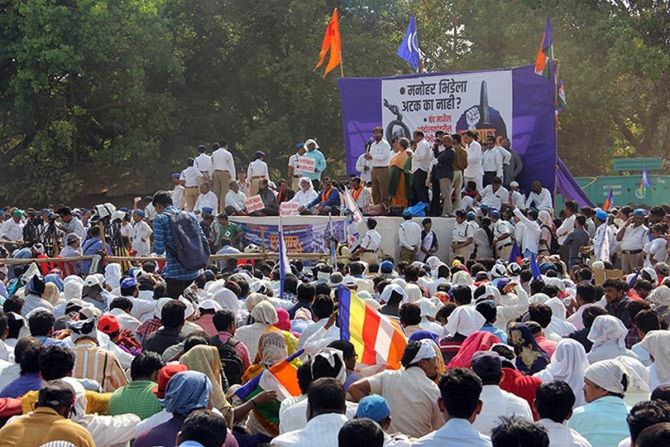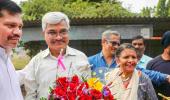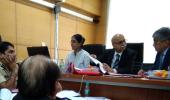Either this affidavit was prepared a long time back, or, Ambedkar has not been following the Commission's hearings.
Jyoti Punwani reports.

He was the main political leader to be associated with the Elgar Parishad, held in Pune's historic Shaniwarwada on December 31, 2017, on the eve of the 200th anniversary of the historic battle of Bhima Koregaon.
The next day, after violence broke out near Bhima Koregaon on January 1, 2018, it was he who led the call for a state-wide protest bandh on January 3, which was heeded by all Dalit groups.
Yet, it took Prakash Ambedkar five years to file his affidavit before the commission of inquiry set up to investigate the violent incidents of January 1 and January 3, 2018.
Ambedkar, who filed his affidavit on Monday, July 24, had made a brief appearance before the Commission right at the start in September 2018. He had then suggested that all police officers and government officials involved in handling the incidents -- including then chief minister Devendra Fadnavis -- be summoned first, and only then, other witnesses be called.
He had also submitted an application asking that Sumit Mullick, one of the two members of the Commission, be cross-examined, as he was chief secretary of the state when the incidents took place.
Last year, the Commission summoned him to file his say as head of the Vanchit Bahujan Aghadi, along with the chiefs of other political parties. However, he finally filed his affidavit only on Monday.
***
Ambedkar's affidavit starts off with a brief background of the Elgar Parishad. He describes it as an attempt initiated by the late retired Justice P B Sawant, to revive the history of the Bhima Koregaon battle, and also to bring about reconciliation between the Maratha and OBC communities in Maharashtra. The two communities had become polarised after the rallies held in 2016-2017 by Marathas in support of their demand for reservation, says the affidavit.
Chhatrapati Shivaji Maharaj, says his affidavit, had made soldiers of common peasants and given them self-respect. But the Peshwas brought them back under the caste hierarchy.
January 1, 2018, the day when the British defeated the Peshwas in the battle of Bhima Koregaon, was the day that the 'communal and casteist' rule of the Peshwas (Peshwai), came to an end, says Ambedkar's affidavit.
The organisers of the Elgar Parishad decided to celebrate it as the day when 'social justice' triumphed. It was decided to felicitate the descendants of those who fought in the Bhima Koregaon battle. This was seen as one way of bringing back social harmony.
The affidavit also mentions the role of hardline Hindutvawadi groups in the events leading up to the Elgar Parishad.
For one, these groups were always opposed to the battle of Bhima Koregaon, says the affidavit.
Secondly, it continues, these groups have always found it easy to create a rift between Marathas and OBCs on another ground too.
Marathas worship Shivaji Maharaj, his mother Jijamata and his son Sambhaji Raje as Maratha icons, without accommodating any other sections in their reverence. It thus becomes easy, says the affidavit, for Hindutvawadi organisations to create a rift between Marathas and OBCs over these historical figures.
On both these aspects, the Elgar Parishad would have acted like a foil to these divisive efforts, says the affidavit. So, enraged by this, Hindutvawadi leaders Sambhaji Bhide and Milind Ekbote created another controversy -- over the history of Sambhaji Maharaj's burial.
Sambhaji Raje was slaughtered on the orders of Aurangzeb, who ordered that nobody should touch his dead body and give him a burial. The Dalits believe that it was one of their own, Gobind Gopal Mahar, who dared to bury him.
However, Bhide and Ekbote rejected this theory and propounded one that said that he had been buried by the Maratha Shivale family. This led to a dispute in the village of Vadhu Budruk on December 29, 2017.
These are the events that formed the background of the Bhima Koregaon violence, says the affidavit.

***
The rest of the affidavit is spent on advice to the Commission on exactly what it should investigate.
Reiterating that chief minister Fadnavis and then chief secretary Sumit Mullick be summoned, Ambedkar also asks that then Pune Rural superintendent of police Suvez Haque and then Pune commissioner of police Rashmi Shukla be summoned.
While Shukla has already finished deposing before the Commission, Haque's testimony is ongoing.
Ambedkar then lists the issues which the Commission should investigate. These include:
- Finding out which village sarpanches passed a resolution to boycott the Bhima Koregaon events and observe a bandh on January 1, 2018; who proposed such a boycott, and the role of the talati and gramsewaks there.
- Did the police patil and talatis of these villages inform their nearest police stations about the possibility of tension on January 1, 2018? Did the police send these reports to their seniors?
- Did the director general of police (intelligence) and the Pune Rural SP get information about the likelihood of any untoward incident tension on January 1, 2018? Did they act on it?
- Did Sambhaji Bhide and Milind Ekbote conduct a meeting in village Vadhu Budruk before January 1, 2018? What transpired there? Did the Pune Rural SP come to know?
- CCTV footage from the Sangli bus stand, specially of people going to Pune and Mumbai, should be studied and shown to villagers affected by the violence to check if these people were locals or outsiders, because of Ambedkar's strong suspicion that those who initiated the violence were outsiders. The affidavit points out that Sambhaji Bhide operates from Sangli.
- Call records of Bhide and Ekbote, against whom the first FIR of the Bhima Koregaon violence was filed, should be studied to know which villagers staying in the vicinity of Bhima Koregaon they had called in the three days before January 1.
- Snapshots of mobile/Internet chats of January 1 and 2 were submitted to then CM Fadnavis, who had ordered that they would be investigated. Were they investigated?
- The violence took place in Pune's rural areas, and no violence took place within Pune, where the Elgar Parishad was held. How then did Pune police allege that the violence was the handiwork of 'urban Naxals'?
- The affidavit filed by the Pune rural police in the Supreme Court which described Milind Ekbote and Sambhaji Bhide as the instigators of the violence, be presented before the Commission.
- Bhide was never arrested for this offence. Was there any correspondence/telephonic instructions directing that he not be arrested?
- Did police find anything objectionable in the funding of the Elgar Parishad?

***
These points make it obvious that either this affidavit was prepared a long time back, or, Ambedkar has not been following the Commission's hearings. Apart from Rashmi Shukla having finished her deposition and Suvez Haque having been summoned, some of his other demands have already been dealt with by the Commission.
The affidavit filed by Pune police in the Supreme Court which blamed Bhide and Ekbote for the violence is already part of the record of the Commission. Questions about the funding of the Elgar Parishad have also been asked of then additional commissioner of police Pune South, Ravindra Sengaonkar who was present at the Parishad.
Several policemen, including the investigating officer of the Bhima Koregaon case, Shivaji Pawar, have been cross-examined at length about the official version of the Bhima Koregaon violence, that blames Maoists for having organised the Elgar Parishad and also for the violence that followed on January 1.
It would be interesting to listen to Ambedkar's testimony when he takes the witness stand.
Feature Presentation: Aslam Hunani/Rediff.com










